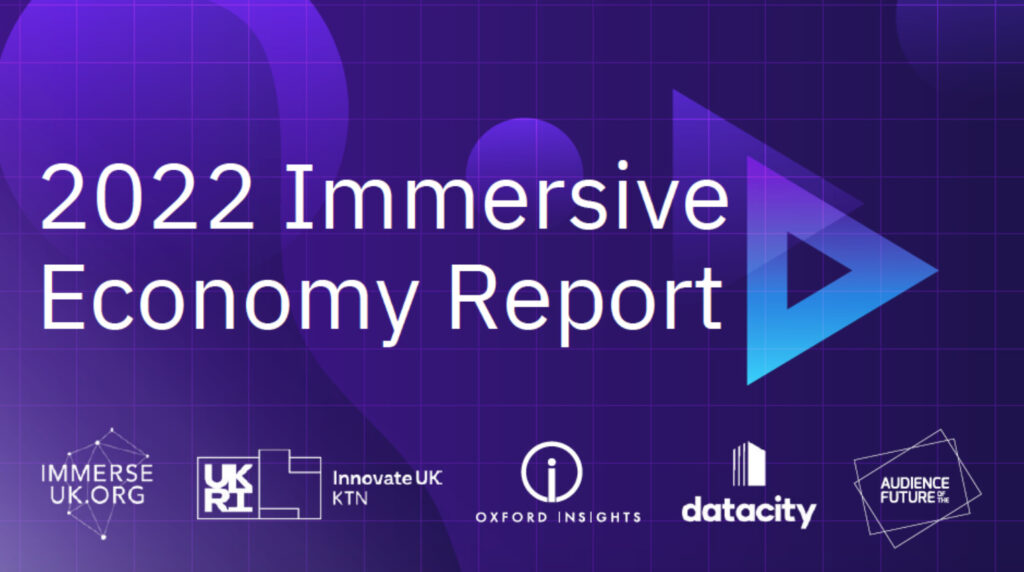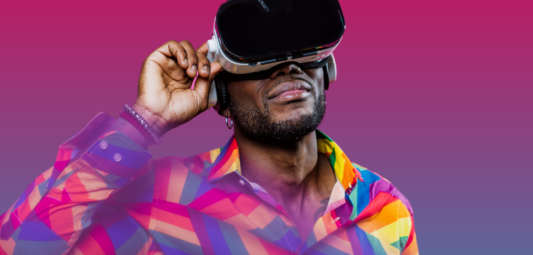The 2022 immersive economy report has recently been released, but what went into making it and what are some key insights?

The 2022 Immersive economy report was commissioned by Immerse UK with Oxford Insights and The Data city. The objective of the report is to understand the key trends in the Immersive economy in the aftermath of the COVID pandemic. The report aims to provide an overview of the scale and the nature of the companies involved in this sector and inform the policy makers and investors of the key growth/opportunities in this sector. The report is quite similar to the 2019 report – it follows a similar structure and covers the key areas such as:
- The landscape of the sector comprises of the number of companies in the sector, turnover.
- The application growth and the economic value of the sector
- Exploration of different geographies / clusters in the immersive economy
- Research and development
- Private and public investment
- Exploring the metaverse
- Future opportunities and challenges

Method
Immersive technology is an emerging sector that has failed to be captured by SIC’s codes. The SIC codes fail to differentiate between the subsectors within the immersive economy such as AR, VR etc. and do not capture the new and emerging sub sectors like Metaverse, Digital human technology etc. As the sector is up and coming and about 40% of the companies in the sector are at the pre-revenue stage, it is hard to get information on these companies through the traditional approach. The Data City provided an alternative approach by capturing the sector accurately using data scraping and machine learning.
The report adopts a combination of The Data City web scraping/ machine learning capabilities, interviews, and surveys with key players in the sector.
The Data City, using the expertise of KTN (Knowledge Transfer Network), built a framework of the Immersive economy and the sub-sectors within it. The Data City developed an RTIC (Real Time Industrial Classification) named Immersive Technologies which previously comprised of only 5 different verticals but now, with the help of the industry experts, it was expanded further to 15 different verticals, namely:
- Augmented Reality
- Virtual Reality
- Mixed Reality
- 360 videos
- Architecture and construction
- Edtech
- Haptics
- Hardware
- Healthcare
- Gaming
- Manufacturing and Engineering
- Media
- Retail and Fashion
- Metaverse
- Emerging Markets

Key Findings
Based on the RTIC, some key findings from the report are:
- 2106 companies were identified to be operating in the immersive technology sector with a growth rate of 83% over the period of five years.
- It is also a sector dominated by micro-SME where 80% of the companies have between 1 to 9 employees.
- Geographically London remains dominant in the immersive businesses with 41% of the companies and 51% of employees in the sector. The report also highlights the strengths of each region and the top players driving the industry.
- Among the immersive economy, healthcare, though smaller in size remains to be the fastest growing sector with 88% growth rate in the last five years.
- Based on our keyword matching/website scraping, the largest application areas for immersive technologies include Education and Entertainment.
- The report also highlights the rapid growth of the concept metaverse and the growing interest among immersive companies to rebrand themselves as a metaverse company. It was easier to map this key change in companies due to the nature of our mapping methodology using language patterns. It would be interesting to see how many more companies would rebrand themselves as this sector develops. If you want to know more about the metaverse companies captured on the platform you can read about it here
This project is one of many highlighting the importance of moving away from traditional classification and validates The Data City’s approach towards classifying the emerging economy.
The project has also been a key in mapping a sector that has not been quite often studied and researched. The report also pointed out that immersive technologies open new markets and sectors to work with. We look forward to digging deeper into these new and emerging areas that will develop in the future in the immersive economy.
For the full details, make sure you check out the full report, and get in touch with us if you have any questions.


